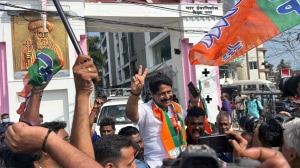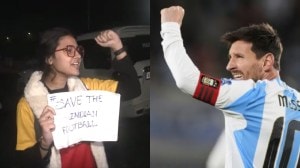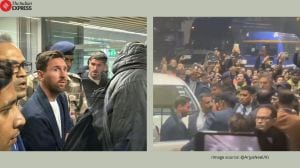‘Can’t change leopard’s spots by bathing it’: Kerala CM Pinarayi Vijayan attacks Jamaat for talks with RSS
As it woos the Muslim vote, CPM has been opposing any overtures by the community or the Sangh towards each other; Pinarayi Vijayan says RSS can't be “refined”.
 Kerala Chief Minister Pinarayi Vijayan. (Express photo by Tashi Tobgyal)
Kerala Chief Minister Pinarayi Vijayan. (Express photo by Tashi Tobgyal) IN A SHARP attack on the Jamaat-e-Islami for being part of a recent meeting the RSS held with Muslim leaders, Kerala Chief Minister Pinarayi Vijayan Saturday said it shows the “hypocrisy” of the Muslim organisation.
“The logic of the Jamaat-e-Islami that the RSS can be refined and reformed through dialogue is tantamount to the belief that the spots of a leopard can be changed by bathing it,” Pinarayi said, adding that the Jamaat should reveal the contents of the discussion.
With Muslims in Kerala seen as disenchanted with the Congress for not effectively holding off the BJP, the CPI(M) has been trying to woo the community. It has also been critical of any outreach by the BJP towards the community.
The Jamaat-e-Islami and its political wing Welfare Party of India, were once known for their pro-Left stand in Kerala, and backed it in elections. From 2015 to 2020, a few panchayats in north Kerala were governed by the LDF with the backing of the Welfare Party. However, the Muslim organisation and its political wing distanced themselves from the Left in the last Lok Sabha polls on the ground that the Congress was the largest party strong enough to emerge as an anti-BJP force. Since then, the CPI(M) has been openly attacking the Jamaat, including calling it communal.
Pinarayi said Friday that whatever the contents of the discussion the Jamaat had with the RSS recently, this could not help the minorities. “At a time that the secular community in the country is fighting against the extremist Hindutva agenda of the RSS, these steps would only help favour it. This is a challenge to secular society,” the CM said.
Rejecting Pinarayi’s stand, Jamaat-e-Islami general secretary T Arif Ali said the dialogue should be seen positively, and that the meeting was far from a secret, and included other representatives from the community. “There is nothing wrong with holding meetings. Lynchings and bulldozer politics figured in the discussion. With attacks against Muslims on the rise, we asked the RSS to make an earnest effort to stop them,” Ali said.
The Kerala general secretary of the Jamiat Ulema-e-Hind, a body of scholars, Aliyar Khasimi, also said discussions could be held with anyone. “Debates are solutions for outstanding issues,” he said.
However, Abdul Samad Pookkottur, a prominent leader of the Muslim scholars’ body SAMASTHA, said talks such as these held no relevance when it comes to the RSS, as the latter “does not acknowledge secularism”. “If someone feels that the Jamaat has surrendered before the RSS, they cannot be blamed. It is up to the Jamaat to clarify (the contents of) its meeting with the RSS,” Pookkottur said, adding that “for issue-based discussions”, the Jamaat could have met the Prime Minister.
Kerala Nadvathul Mujahideen president T P Abdulla Koya Madani criticised both the RSS and Jamaat, calling them “two sides of the same coin”. “They stand for religious nationalism. Both kept away from the freedom struggle,” he said.
In other interactions between the RSS and the Muslim community in Kerala, in December last year, the prominent Kerala Nadvathul Mujahideen had invited BJP leader and Goa Governor P Sreedharan Pillai for their state conference. A few BJP leaders had also attended some of the events.
Several CPI(M) leaders, led by party MP John Brittas, had criticised the Mujahideen, asking whether its leadership believed that the approach of the Sangh Parivar towards minorities could be changed through dialogue. Brittas had also raked up the Babri Masjid issue, to underline his point.
The RSS meeting with Muslim community leaders and representatives in Delhi last month was its second such interaction. The Sangh brought up the possibility of amicable resolution of Kashi and Mathura issues, and the “dangerous” practice of Muslims living in ghettos, at the talks.
Sources told The Indian Express that, to the Muslim side’s question as to whether resolution of the Kashi and Mathura issues would ensure that there were no further demands for any other site, RSS leaders had said they could not guarantee the thinking of the Hindu society in the future.
- 01
- 02
- 03
- 04
- 05






























